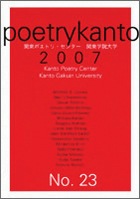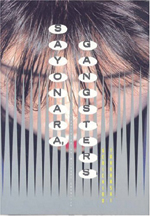Minor Press 小出版
Poetry Kanto

|
Poetry Kanto is one of the finest poetry journals in Japan. Bilingual and published annually, it features contemporary English-language poetry as well as 20th century Japanese poetry in translation. Although officially launched in 1968 and published again in 1970, it wasn’t until 1984 that it resumed publication. Since then, it has been going strong, introducing readers both in Japan and around the world to work from excellent American, British, Australian, Irish and Japanese poets (English-language poets from other countries of course welcome). The 2009 edition will be coming out late this year. For information on back issues, submissions and more, please refer to their website: home.kanto-gakuin.ac.jp/~kg061001 (or just run an internet search!) |
詩誌「ポエトリ関東」のご紹介。英語と日本語のバイリンガルで編集され一年に一回の発行で、現在第一線で活躍している詩人による英語詩、20世紀の日本詩人による作品などを掲載。初版発行は1968年で1970年にも発行されたが、その後再び発行されたのは1984年になってから。その後はアメリカ、イギリス、オーストラリア、アイルランドなど日本国内外で活躍する詩人の作品を毎年紹介し、人気を博してきた。2009年版は年内に発行予定。バックナンバー、定期購読などの問い合わせは「ポエトリ関東」ウェブサイトまで。 home.kanto-gakuin.ac.jp/~kg061001 |
Borderless Reading ボーダレス読物
Sayonara Gangsters

|
Takahashi Gen’ichirô’s novel Sayonara Gangsters (1981) was a sensation when it debuted, winning the Gunzo Literary Award for first novels. Widely considered one of contemporary Japan’s finest writers, he was born in the post-war period and his work is best described as postmodern. It frequently challenges notions of genre—notions of everything, really. Readers trying to derive meaning from his work may want to ask what meaning means… Sayonara Gangsters is set in some future time where none of the conventions we know apply to life. The protagonist in this semi-autobiographical ‘novel’ dabbles in extremist politics much to his detriment (Takahashi himself was arrested as a student radical in 1969 and spent six months in jail). The rollercoaster of a story is of course pure fantasy, but truths linger beneath the surface and like much of Abe Kobe’s work, it’s both alienating and familiar. And highly entertaining, too. |
高橋源一郎はデビュー作の「さようなら、ギャングたち」(1981年)でいきなり注目を浴び、同作品は群像新人長編小説賞で優秀作に選ばれた。現代日本を代表する作家の一人として広くその名が知られる高橋は、戦後生まれで完全なるポストモダニストである。ジャンル分け不可能であまりに前衛的な作風は、内容を理解するのに苦労する読者もいるほどだ。 「さようなら、ギャングたち」は現在の我々の慣習というものが全く通用しない仮想未来社会が舞台である。この自伝的な匂いもする小説の主人公はいわゆる過激派として描かれている(高橋は実際に過激派学生として1969年に逮捕され6ヶ月間服役した経験を持つ)。 目まぐるしく展開するストーリーは無論フィクションだが、どこかしら現実味を帯び、よそよそしくもあれば親近感も感じさせるという多面性を持っている。いずれにしてもとても面白い小説なので是非読んでみて欲しい。 |








